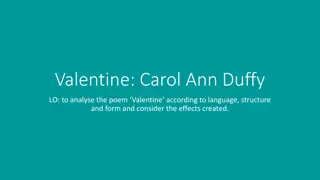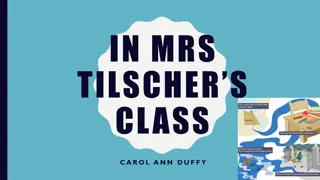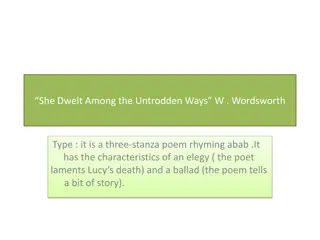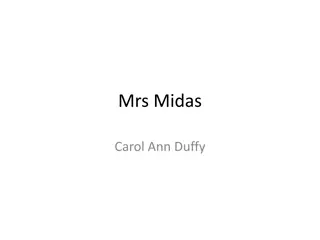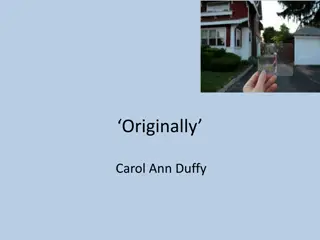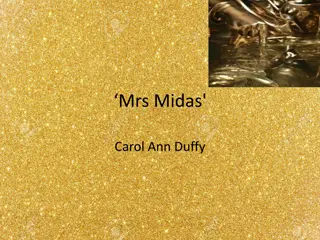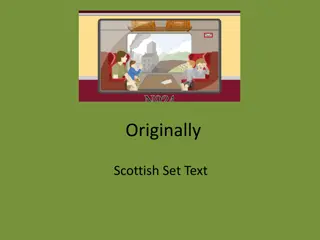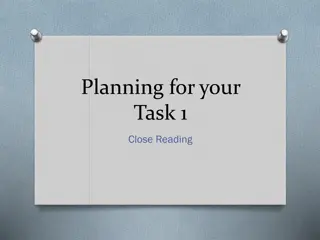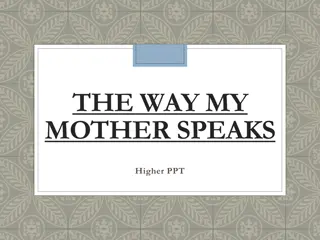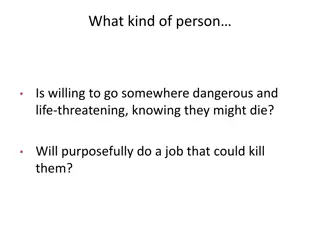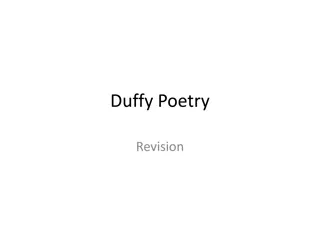Originally Textual Analysis: Understanding Duffy's Poem Stanza by Stanza
Explore the emotional journey depicted in Duffy's poem "Originally" as the narrator recounts the family's relocation from Scotland to England. The analysis delves into themes of reluctance, unease, and identity conflict, highlighting the speaker's evolving perspective on home and belonging.
Uploaded on Sep 25, 2024 | 6 Views
Download Presentation

Please find below an Image/Link to download the presentation.
The content on the website is provided AS IS for your information and personal use only. It may not be sold, licensed, or shared on other websites without obtaining consent from the author.If you encounter any issues during the download, it is possible that the publisher has removed the file from their server.
You are allowed to download the files provided on this website for personal or commercial use, subject to the condition that they are used lawfully. All files are the property of their respective owners.
The content on the website is provided AS IS for your information and personal use only. It may not be sold, licensed, or shared on other websites without obtaining consent from the author.
E N D
Presentation Transcript
Originally Textual Analysis
1. Describe what the poem is about, focusing on each stanza individually. (3) Stanza 1 - focus on the family s relocation from Scotland to England and, in particular, Duffy s reluctance. (1) Stanza 2 - focus on idea of being in the new place but not managing to fit in and feeling uneasy. (1) Stanza 3 - focus on idea of Duffy now having assimilated into her new home but still feeling that part of her belongs in Scotland - conflict of identity. (1)
Example answer Stanza 1 portrays Duffy s anxiety regarding leaving behind everything she has ever known. It shows the family dynamic as Duffy notes her surroundings, how each member of the family has different thoughts and emotions. The fear, the hate, the will to resist. Stanza 2 shows hints of a resistance to accept the culture - she is different to those around her, feels alone and her parents fear for their child s happiness. Stanza 3 shows that Duffy has finally begun to accept her new beginning. She remembers her old home but had adapted to her new life and is trying to make this place a home.
2. What tone is used in stanza 1? (1) Confused, uneasy, distressed, anxious, lost, frantic. (1) (sad, upset was a little too vague)
3. How does Duffy use word choice to emphasise the speaker s tone in stanza one? (2) fell through the fields - connotations of lack of control, disorientation - reflects Duffy s panic and confusion over why they had to move. bawling - connotations of serious distress, upset, uncontrollable emotion - Duffy exaggerates to show how her brother s severe reaction upsets her and only adds to her sense of panic Home, Home - nostalgic - to express how much she desires to return and how she spends time dwelling sadly on what she has lost stared at the eyes of a blind toy - connotations of uncertainty, lack of sight, lost, passivity - suggests Duffy get she had no control and was being led through the change without consideration, idea of her feeling confused and lost in this change holding its paw - connotations of vulnerability, seeking comfort, childhood - suggests that young Duffy feels lost and that she needs emotional support for this big change
Example answer The use of the word blind has connotations of lacking vision, confusion. This shows how, much like the toy, Duffy is also unaware as to what is going on. She cannot see clearly why it is happening and cannot comprehend it. The word choice of toy is also used as it has connotations of childhood which reflect how young and vulnerable the speaker is, therefore emphasising the tone as it causes the reader to sympathise with the speaker during this distressing time.
4. All childhood is an emigration. Fully analyse this image. (2) Idea of childhood involving big changes, a big upheaval, moving from the known into the unknown. (1) Childhood is similar as we all experience new things with which we are not comfortable or experienced in. A challenge or change which holds who we become. (1)
Example answer This metaphor is saying that the process of growing up is a journey. Emigrations tend to be long and difficult as emigrants must adapt to a new way of life and a new culture. By saying that childhood is an emigration, Duffy is emphasising the difficulties faced when growing up and how one must adapt and mature. All is inclusive which further highlights that this is something that every child will have to experience one way or another.
5. Show how the poet highlights features of each emigration in lines 9-14. You should refer to word choice and sentence structure. (4) Some are slow Long sentence - elongated, conveys how tedious, drawn out some emigrations are - idea of progressing gradually and having time to adjust to changes. resigned - connotations of acceptance, passivity suggests these children have had time to slowly assimilate and embrace the changes experienced Others are sudden Short sentences to show how abrupt some changes are and how they are forced upon some without warning. sudden - connotations of surprise, unexpected, abrupt wrong connotations of unacceptable, incorrect, frowned upon, isolation - shows how quickly some barrier appear such as accent. No leeway - must conform. unimagined - new, foreign, uncertain, strange - idea of being thrust into a new environment, highly different to the one we are used to without preparation
Example answer The long sentence Some are slow you know stays. has an elongated, flowing structure which portrays the gradual changes most children face. The word choice of resigned has connotations of no longer caring or quitting. There is the idea that you give up after a long haul of effort which links to the slow and gradual change. The word choice of unimagined has connotations of the unknown and unfamiliar. It conveys that her new home was alien to her because it was such an abrupt transition. sudden has connotations of the unexpected or having no warning. This shows how Duffy felt her emigration was something she couldn t prepare for as it was so abrupt.
6. How effectively does Duffy use language features to emphasise the speaker s anxiety in the second stanza? (2) Your accent wrong. - short sentence - abrupt, her voice serves as a barrier to acceptance. Upset over the fact that something as simple as language prevents her from belonging. unimagined - connotations of uncertainty, unknown, foreign big boys - plosives - highlight intimidating nature of the local boys shouting words you don t understand - connotations of aggression and violence behaviour, also of confusion My parents anxiety stirred like a loose tooth - simile - loose tooth is constant irritant which is hard to escape - reflect how her anxiety about assimilating was always at the back of her mind, constantly troubling her
Example answer The simile of anxiety stirred like a loose tooth in my head accentuates the speaker s anxiety as it shows how prominent it is. The anxiety always fills her thoughts. Just like a loose tooth she finds it difficult to ignore and move past. Just as a loose tooth hangs on barely, Duffy is the same, as if any minute the anxiety can consume her and she ll fall apart.
7. Explain how the language of lines 17 - 21 helps you to appreciate the change introduced by the word But (4) List in first line of stanza - vague, passive statement shows that Duffy now acknowledges that people move on and don t stay hung up on things which bothered them before. Acceptance and eventual moving on. Seeing your brother swallow a slug - alliteration links back to earlier in poem when these boys terrified her - shows that Duffy s family muse have assimilated as her brother is now one of them. feel only a skelf of shame - alliteration - shows how far on Duffy has come as she is no longer bothered by the behaviour which once disgusted her - beginning to accept that which she could not before. shedding its skin like a snake - simile - idea of leaving behind the old to make way for the new - dropping her accent after having been there for so long - no longer standing out as an individual in the crowd. snake has connotations of evil - could be Duffy s admittance that she may have betrayed her country by moving on and changing. just like the rest - word choice suggests a lack of originality and a bitterness which comes with this. Her accent has gone and she no longer stands out form the rest of her peers.
Example answer shedding its skin like a snake - just as a snake loses its outer layer often, replaced by a newer and healthier one, Duffy s accent begins to change to fit in with the rest of her classmates. However, just as a snake s shedding skin only changes its outward appearance, Duffy s accent doesn t necessarily reflect any change in her person. The simile helps you appreciate the change as she is beginning to fit in. By using the image of a snake with connotations of betrayal and biblical malevolence, Duffy demonstrates guilt at losing her Scottish accent as she sees it as turning against her homeland. The passive list in line 17 highlights the ease at which childhood memories are forgotten and how quickly one can learn to adapt to a new set of circumstances. This helps to show the change as it explains more about why Duffy has been able to fit in despite her earlier difficulties.
8. How effective is the use of a skelf of shame in the final stanza? (2) As a skelf is a small sliver of something, this shows that she has now come to accept the behaviour as she only feels a little bit of shame. The actions which alienated her before have now become the normality. (2) Idea that she has not completely lost her Scottish roots as skelf is from the Scots dialect. (1)
Example answer skelf has connotations of splinter or a little amount of something. It is a Scottish word which shows that although she feels more as home in England now, she hasn t completely forgotten where she came from. Seeing her brother swallow a slug would have been unimaginable before the move but now it is normality and she only feels slightly guilty that she has let it become a normal sight.



